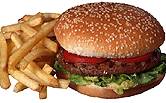
MONDAY, July 16 (HealthDay News) — New York City’s restriction on the use of trans fats in foods served at restaurants is helping Big Apple residents cut down on the unhealthy fat, a new study shows.
Researchers compared purchase receipts from fast food restaurants in 2007, before the ban went into effect, to those from 2009, after it went into effect.
Trans-fat intake decreased, said researcher Christine Curtis, director of nutrition strategy at the New York City Department of Health and Mental Hygiene.
“It’s a substantial drop,” she noted.
The average drop in trans fats per purchase — which included food for just one person — dropped 2.4 grams, Curtis said. It started at 2.9 grams of trans fat per purchase and dropped to 0.5 grams.
Saturated fat increased a bit, to 0.55 grams per purchase. But overall, when the researchers looked at trans and saturated fats together, it was still a drop of 1.9 grams of unhealthy fats per person.
On average, the diners saw a decline in trans fats of about 21 calories per purchase, Curtis said.
That is enough to help heart health, experts think. “It’s been estimated that 40 calories from trans fats per day increases the risk of coronary heart disease by 23 percent,” Curtis said.
The study is published in the July 17 issue of the Annals of Internal Medicine.
The researchers also found that the number of meals that had no trans fat increased to 59 percent after the ban went into effect, compared with 32 percent before.
The greatest decline in trans fat purchases were seen at hamburger chains, followed by Mexican food chains and fried chicken restaurants.
For the study, Curtis and her team compared the trans fat and saturated fat content of 6,969 purchases in 2007 with 7,885 purchases in 2009. They went to 168 New York City locations of 11 fast-food chains at lunchtime.
They asked to look at diners’ receipts as they left and asked them to complete a survey.
Although some protested the New York City ban on trans fats in restaurant food as akin to the nation’s largest city becoming a ”nanny state,” the new research suggests it is working to make city residents’ diets more heart-healthy.
Saturated fats are solid fats found primarily in animal foods, including meat and dairy products, as well as in baked goods and fried foods. Trans fats are formed when processing a vegetable oil into a more solid fat like margarine or shortening, according to the U.S. Department of Agriculture (USDA).
Some experts feared that with the ban, saturated fats would replace the trans fats, Curtis said. But their study suggests that did not happen. “The concern that saturated fats would increase the same amount [as the trans fats decreased] was not observed,” she said.
Since the New York ban became effective, 15 other jurisdictions have launched similar bans, Curtis said, citing information from the Center for Science in the Public Interest.
The New York City regulation was phased in beginning July 2007. It was in full effect a year later. Under it, all food-service establishments are restricted from using, storing or serving foods that have partially hydrogenated vegetable oil with a total of 0.5 grams or more trans fat per serving.
In an editorial accompanying the study, Alice Lichtenstein, a distinguished professor of nutrition science at Tufts University, said that issues raised by the restaurant industry before the ban have not materialized.
One concern, for instance, was that the switch to heart-healthier oils would be expensive. In fact, the switch is cost neutral, she said.
The New York City trans fat ban, she said, suggests that well-planned and executed public health measures work well.
Lichtenstein said that it is difficult to predict success at an individual level due to the trans-fat ban. “For someone who regularly purchases foods affected by the ban, for example, fried foods, the effect on them is likely to be substantial. For some who rarely purchases food prepared outside the home, the effect of the ban on them is likely to be minimal.”
The major public health challenge, she writes, is still one of excess, with many people simply eating too many calories on a daily basis.
Foods with several grams of trans fat per serving are still widely available at grocery stores and restaurants, according to the Center for Science in the Public Interest. In a report earlier this year, it listed some, including buttermilk biscuits, frozen pizzas and pies from chain restaurants.
More information
To learn more about trans fat bans, visit the Center for Science in the Public Interest.

